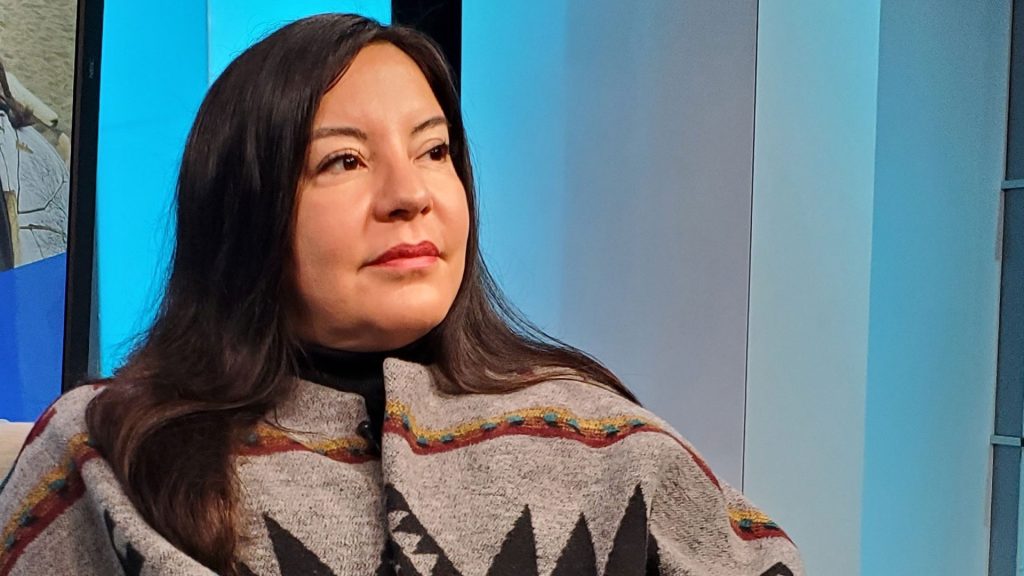
Leah Ballantyne, a Cree lawyer from Pukatawagan First Nation in Manitoba, is advocating for "pretendians" to be investigated by police. Photo: APTN News
A Cree lawyer feels it’s time to get tough with “identity shifting and pretendianism” – especially when a benefit could be gained.
Leah Ballantyne, a member of Pukatawagan First Nation north of Winnipeg who practices law in both Manitoba and British Columbia, has spoken about potential consequences before.
But now, as questions swirl around the Indigenous identity of a federal politician and companies vying for federal government contracts, Ballantyne repeated her call.
False claims of Indigenous identity are “extremely harmful to Indigenous people, including myself,” she said from her home in B.C. “… Especially in an era of truth and reconciliation.
“Obviously, we’re never going to get to a reconciliation with our Indigenous Peoples in this country if we’re not going to acknowledge the truth.”
Global News was first to report that questions are being raised about companies in the federal government’s Indigenous Business Directory.
Read more:
Cabinet minister Randy Boissonnault apologizes over Indigenous identity claims
Some 1,100 companies who claimed to be Indigenous-owned were removed from the database in 2022, said Indigenous Services Minister Patty Hajdu Tuesday.
The database is intended to list First Nations, Inuit or Métis-owned businesses eligible to access “set aside” contracts only accessible to Indigenous companies.
“I don’t know if Canadians really understand the background of why this Indigenous procurement directory exists, but it’s because First Nations, Inuit and Métis people were left out of the bigger economy because of racial laws like the Indian Act and being forced onto reserves,” said Ballantyne.
“… So that ‘set aside’ was actually put there to try to repair that harm. And the fact that there are people now who have no right to claim that procurement or trying to access it is continuing the harm.”
The National Post has reported that a company co-owned by Liberal MP and Employment Minister Randy Boissonnault unsuccessfully bid on two federal contracts in 2020 while identifying itself as Indigenous and Aboriginal-owned.
Boissonnault has said the family he was adopted into has Indigenous ancestry and his adoptive mother and brother have their Métis citizenship.
A Prime Minister committed to true reconciliation would have removed Randy (and the other Randy) from Cabinet long ago. Instead we get to watch white people play ancestry wheel of fortune.
So shameful and extremely destructive! #CdnPoli https://t.co/7FCCdjas3k
— Jody Wilson-Raybould (JWR), PC, OBC, KC 王州迪 (@Puglaas) November 19, 2024
Boissonnault, who represents Edmonton Centre, has previously sat as a member of the Liberal Indigenous Caucus, but said he joined it as an ally representing many Indigenous people in his community.
He has been described as Indigenous multiple times in communications from the Liberal party and in 2018 referred to himself as “non-status adopted Cree.”
Ballantyne said false claims of Indigenous identity have recently been exposed in the fields of academia and entertainment and now it’s allegedly “at the heart of the government.”
She said it’s time for the government to review the 94 calls to action recommended by the Truth and Reconciliation Commission in 2015 to “refocus their relationship with Indigenous people.”
That goes double for anyone in government, she added.
“Anyone who is a member of government on any level who takes an oath of office has to have a higher ethical standard and adhere to that oath of office for the benefit of not only Indigenous people, but for all Canadians,” Ballantyne said in an interview.
Read More:
Danielle Smith says she has Cherokee roots
“I think certainly the police could investigate the background of Mr. Boissonnault’s submissions to the Indigenous procurement directory,” she added, “… and once their investigation is concluded they would decide whether or not they would charge under the Criminal Code for the charge of fraud.”
On Wednesday, Prime Minister Justin Trudeau’s office announced Boissonnault would step away from the cabinet “to focus on clearing the allegations made against him.”
Boissonnault has apologized for the shifting claims about his Indigenous identity.
He said at an unrelated announcement in Edmonton on Nov. 15 that he’s sorry “with everything that I know now.”
“I apologize that I wasn’t as clear as I could have been about who I am and my family’s history,” he said, adding that he’s still learning about his family’s heritage “in real time.”
He said he’ll have to confirm his great-grandmother’s status, but his mother and brother are citizens of the Métis Nation of Alberta.
“I apologize if that particular way of referring to myself — I apologize that it was inaccurate.”
Otipemisiwak Métis Government
The Métis Nation of Alberta, which changed its name to the Otipemisiwak Métis Government in September 2023, said Wednesday its membership list is confidential.
But President Andrea Sandmaier told APTN News in a statement that “false claims of Métis ancestry cause great harm to our communities and undermine the trust we have built in our registry process.
“The Otipemisiwak Métis Government has the strongest objectively verified citizen registry system in the country,” Sandmaier added, noting that “when an individual says they are Métis and shows their Otipemisiwak Métis Government Citizenship card, the public can rest assured they have undergone a rigorous registry application and review process.”
APTN asked Boissonnault’s office for comment but did not hear back.
Meanwhile, Boissonneault is not the first Alberta politician to be questioned about claiming Indigenous roots.
In 2022, Premier Danielle Smith told the Alberta legislature her great-great-grandmother was a member of the Cherokee Nation in the United States. She repeated the claim during her run to become leader of the Alberta United Conservative Party.
However APTN, working with a genealogist, could find no evidence to demonstrate her family is Cherokee.
-with files from The Canadian Press










